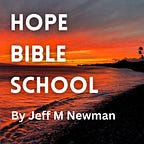Welcome back to the Hope Bible School verse-by-verse Bible study of 1 John. This is Jeff M Newman. Get a new lesson every other week on Monday at 12:00 PM Eastern.
We are now on Lesson 21 and we are going to study 1 John 2:2.
But first, let’s review what we learned from 1 John 2:1 in Lesson 20.
Let’s read the verse.
1 John 2:1 My little children, I am writing these things to you so that you will not sin. But if anyone does sin, we have an advocate before the Father—Jesus Christ, the Righteous One.
Here’s what we learned:
Help the next generation grow in their relationship with God.
Don’t give yourself license to sin, just because God will forgive you.
Make it your goal to not sin, so that you can maintain fellowship with God.
Know that Jesus is your advocate, when you do sin.
Understand that Jesus can be your advocate, because He is righteous and died in your place.
In Lesson 21, we will learn about Jesus Christ being the atoning sacrifice for us and for all people. It’s crucial to understand that in order to receive forgiveness, we must believe in the atoning sacrifice that Jesus made on our behalf and to repent from our sins.
Let’s read our verse for Lesson 21.
1 John 2:2 He Himself is the atoning sacrifice for our sins, and not only for ours but also for the sins of the whole world.
Let’s focus on the first part of the verse: He Himself is the atoning sacrifice for our sins.
He Himself is speaking about Jesus Christ.
The atoning sacrifice serves as the means to appease or satisfy the wrath of God and bring about reconciliation between God and humanity.
Jesus Christ willingly offered Himself as a sacrifice to pay the price and provide restitution for our sins through His death on the cross.
Jesus bore the weight of our sins and suffered on our behalf.
This sacrifice was necessary because there had to be a payment to satisfy the wrath of God.
When we speak of God's wrath, we are referring to His righteous anger and judgment towards sin, rebellion, evil, and ungodliness.
God's wrath is a reflection of His holy and just nature. God does not tolerate sin and is fully committed to upholding righteousness.
In Romans 2:5, we read that God is storing up wrath against those who have hard and unrepentant hearts.
Romans 2:5 But because of your hard and unrepentant heart, you are storing up wrath against yourself for the day of wrath, when God’s righteous judgment will be revealed.
In Nahum 1:2, we read that God reserves wrath for His enemies.
Nahum 1:2 The LORD is a jealous and avenging God; the LORD is avenging and full of wrath. The LORD takes vengeance on His foes and reserves wrath for His enemies.
In Colossians 3:5-6, we read about the types of things that can provoke the wrath of God and the consequences if we fail to put these things to death.
Colossians 3:5-6 Put to death, therefore, the components of your earthly nature: sexual immorality, impurity, lust, evil desires, and greed, which is idolatry. 6 Because of these, the wrath of God is coming on the sons of disobedience.
In John 3:36, we read that if you believe in Jesus, you will receive eternal life. However, if you reject Him, the wrath of God will remain upon you.
John 3:36 Whoever believes in the Son has eternal life. Whoever rejects the Son will not see life. Instead, the wrath of God remains on him.
God, in His great love and mercy, has graciously provided Jesus as the only means through which His wrath can be satisfied and people can be reconciled to Him.
There is nothing we can do to satisfy His perfect justice, and it is not possible for us to atone for our own sins. Therefore, we must approach God the Father through Jesus.
In John 14:6, we read that there is no way to come to the Father, except through Jesus.
John 14:6 Jesus answered, “I am the way and the truth and the life. No one comes to the Father except through Me.
In Mark 1:11, we read that God the Father is well pleased with Jesus. This establishes Jesus as the only person capable of satisfying God's wrath.
Mark 1:11 And a voice came from heaven: “You are My beloved Son; in You I am well pleased.”
In 2 Corinthians 5:21, we read that God Himself took the initiative in sending His Son as the atoning sacrifice for our sins.
Christianity distinguishes itself from other religions by not relying on appeasing gods through offerings or sacrifices.
It is only in Christianity that God Himself provided a way for humans to be reconciled to Him.
God offered Himself as the means to satisfy His own wrath.
2 Corinthians 5:21 God made Him who knew no sin to be sin on our behalf, so that in Him we might become the righteousness of God.
Now let's shift our attention to the final portion of 1 John 2:2: "and not only for ours but also for the sins of the whole world."
Previously, we discovered that Jesus served as the atoning sacrifice for our sins. In this part of the verse, we will gain insight into the broader scope of His sacrifice—it extends to encompass the sins of the entire world.
The significance of Jesus' sacrifice is not restricted to a particular group of individuals; rather, it applies to all people, irrespective of their nationality, tribe, ethnicity, or background.
As you go about your day and encounter people, remember that Jesus died for each and every person you see. This perspective will help you enhance the love you have for others.
In John 1:29, we read about the significant moment when John the Baptist saw Jesus approaching him for baptism and declared that Jesus would take away the sin of the entire world.
John 1:29 The next day John saw Jesus coming toward him and said, “Look, the Lamb of God, who takes away the sin of the world!
In 1 Timothy 2:5-6, we read that Jesus willingly offered Himself as a ransom for all.
1 Timothy 2:5-6 For there is one God, and there is one mediator between God and men, the man Christ Jesus, 6 who gave Himself as a ransom for all—the testimony that was given at just the right time.
In Hebrews 2:9, we read that Jesus tasted death for everyone. This signifies that His sacrificial death was undertaken on behalf of all people. He willingly faced death to offer salvation to humanity.
Through His death, salvation and atonement were made available to all people, regardless of their background or the extent of their sins.
Hebrews 2:9 But we see Jesus, who was made a little lower than the angels, now crowned with glory and honor because He suffered death, so that by the grace of God He might taste death for everyone.
However, the atoning sacrifice does not automatically guarantee forgiveness of sins for everyone, but it opens up the possibility of forgiveness.
Jesus extends forgiveness and salvation to anyone who believes in Him, accepts His atonement, and repents. To repent means that a person turns away from sin and genuinely seeks forgiveness.
In John 3:16, we read that we must believe in Jesus in order to receive eternal life.
John 3:16 For God so loved the world that He gave His one and only Son, that everyone who believes in Him shall not perish but have eternal life.
In Revelation 22:17, we read that the water of life, which symbolizes salvation, is offered to all who come to God and drink freely.
Revelation 22:17 The Spirit and the bride say, “Come!” Let the one who hears say, “Come!” And let the one who is thirsty come, and the one who desires the water of life drink freely.
In Romans 10:9-10, we read that if you believe in your heart that Jesus rose from the dead and confess with your mouth that Jesus is Lord, you will be justified and saved.
Romans 10:9-10 that if you confess with your mouth, “Jesus is Lord,” and believe in your heart that God raised Him from the dead, you will be saved. 10 For with your heart you believe and are justified, and with your mouth you confess and are saved.
Now, let’s read some verses where Jesus teaches us that we must repent.
Matthew 4:17 From that time on Jesus began to preach, “Repent, for the kingdom of heaven is near.”
Mark 1:14-15 Now after John had been taken into custody, Jesus came into Galilee, preaching the gospel of God, 15 and saying, “The time is fulfilled, and the kingdom of God is at hand; repent and believe in the gospel.”
Luke 13:5 No, I tell you. But unless you repent, you too will all perish.”
Luke 24:46-47 And He told them, “This is what is written: The Christ will suffer and rise from the dead on the third day, 47 and in His name repentance and forgiveness of sins will be proclaimed to all nations, beginning in Jerusalem.
In conclusion, here’s what we’ve learned from 1 John 2:2.
An atoning sacrifice is necessary to appease and satisfy the wrath of God, leading to reconciliation between God and humanity.
God's wrath is a reflection of His holy and just nature. He does not tolerate sin and is fully committed to upholding righteousness.
God, in His great love and mercy, has graciously provided Jesus as the only means through which His wrath can be satisfied and people can be reconciled to Him.
The significance of Jesus' sacrifice is not restricted to a particular group of individuals; rather, it applies to all people, irrespective of their nationality, tribe, ethnicity, or background.
The atoning sacrifice does not guarantee automatic forgiveness of sins for everyone, but it opens up the possibility of forgiveness. To receive salvation, you must believe that Jesus died for you and rose from the dead and repent of your sins.
Let’s read today’s verse one more time.
1 John 2:2 He Himself is the atoning sacrifice for our sins, and not only for ours but also for the sins of the whole world.
If you’ve been blessed by Hope Bible School, please share it with others.
If you have any prayer requests, please share them in the comments.
Thank you and God bless you!
~ Jeff M Newman
(Photo by Tomáš Malík on Unsplash. Skógafoss, Island. Berean Study Bible.)












